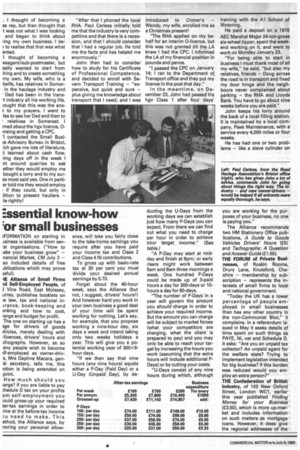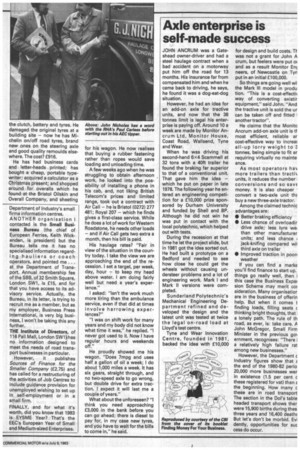Essential know-how or small businesses
Page 24

Page 25

If you've noticed an error in this article please click here to report it so we can fix it.
'FORMATION on starting in Jsiness is available from soyal organisations. ("How to ake your business grow" — nancial Market, CM July 2 — so included details of free ..iblications which may prove
5eful).
1E Alliance of Small Firms id Self-Employed People, of 2 Vine Road, East Molesey, urrey, publishes booklets on le law, tax and national inJrance, book-keeping and inking and how to cost, large and budget for profit. The one on starting up has a 3ge for drivers of goods 'hides, merely dealing with -licences, drivers' hours and chographs. However, as so any people wish to become If-employed as owner-drivs, Mrs Daphne Macara, genel secretary, tells me, this ction is being extended on print.
How much should you large? If you are liable to pay thedule D tax on your profits om self-employment you iould gross-up your required ter-tax earnings in order to rive at the before-tax income )u need to make. This ethod, the Alliance says, by noring your personal allow ance, will take you fairly close to the take-home earnings you require after you have paid your income tax and Class 2 and Class 4 NI contributions.
To gross up with basic-rate tax at 30 per cent you must divide your desired annual earnings by 0.70.
Forget about the 40-hour week, says the Alliance (but not, I suggest, drivers' hours!) And however hard you work in your own business a good deal of your time will be spent working for nothing. Let's say, for example, that you propose working a nine-hour day, six days a week and intend taking only two weeks holidays a year. This will give you a potential working year of 300 X 9hour days.
"If we then say that nine hours (any nine hours) equals either a P-Day (Paid Day) or a U-Day (Unpaid Day), by de
ducting the U-Days from the working days we can establish just how many P-Days you can expect. From there we can find out what you need to charge per hour in order to achieve your target i nco me. " (See table.) "A P-Day may start at midday and finish at 9pm; or early risers might work between Sam and 8am three mornings a week. One hundred P-Days could be made up of 3-paid hours a day for 300-days or 10hours a day for 90-days.
"The number of P-Days in a year will govern the amount you should charge in order to achieve your required income. But the amount you can charge will be subject to market forces (what your competitors are charging, what the client is prepared to pay) and you may only be able to reach your target by increasing the hours you work (assuming that the extra hours will include additional PDays) or by cutting your costs.
"U-Days consist of any nine hours during which, although you are working for the purposes of your business, no one is paying you."
The Alliance recommends two HM Stationery Office publications, A Guide to Goods Vehicles Drivers' Hours (£5) and Tachographs: A Question and Answer Guide (E1.50).
THE FORUM of Private Businesses, of Ruskin Rooms, Drury Lane, Knutsford, Cheshire — membership by subscription — represents the interests of small firms to local and national government.
"Today the UK has a lower percentage of people employed in small businesses than has any other country in the non-Communist Bloc," it complains. In a referendum issued in May it seeks details of time spent on such things as PAYE, NI, vat and Schedule D. It asks: "Are you an unpaid tax collector? An unpaid agent for the welfare state? Trying to implement legislation intended for big business? If this burden was reduced would you employ an extra person?"
THE Confederation of British Industry, of 103 New Oxford Street, London WC1, earlier this year published Finding Money for your Business (0.50), which is more up-market and includes information on such matters as mortgage loans. However, it does give the regional addresses of the Department of Industry's small firms information centres.
ANOTHER organisation I contacted is the Small Busi ness Bureau (the chief of
European Ferries, Keith Wickenden, is president) but the
Bureau tells me it has no specialised information regarding hauliers or coach operators, and pointed me . .
at the Department of Transport. Annual membership fee of the SBB, of 32 Smith Square, London SW1, is £15, and for that you have access to its ad visory service. Actually, the Bureau, in its letter, is trying to recruit me as a member, but as my employer, Business Press International, is very big business, I won't be taking this any further.
THE Institute of Directors, of 116 Pall Mall, London SW1 ./ has no information designed to meet the needs of road transport businesses in particular.
However, it publishes Sources of Finance for the Smaller Company (E2.75) and has called for a restructuring of the activities of Job Centres to include guidance provision for unemployed wishing to set up in self-employment or in a small firm.
FINALLY, and for what it's worth, did you know that 1983 is EYSME Year? That's the EEC's European Year of Small and Medium-sized Enterprises.




















































































